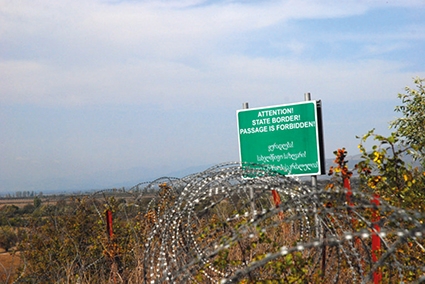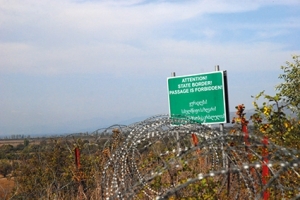More Barbed Wire Goes Up Near Gori
On Wednesday morning, the European Union Monitoring Mission (EUMM) hotline was activated, reporting yet another violation of Georgia’s territorial integrity. The EUMM has been active in Georgia since October 1, 2008, less than two months after the end of the Georgia-Russia August War. The mandate of the unarmed civilian mission is to monitor compliance with the ceasefire agreement that ended the war. They also operate a hotline 24 hours a day, 365 days a year, which is activated in the case of administrative boundary line (ABL) and other occupation-related incidents such as the kidnappings that are all too common near the ABL with so-called South Ossetia. There are two EUMM hotline holders who have counterparts in Georgian law enforcement agencies and in the Russian Federation ‘border’ guard and representatives of the de-facto administrations of Abkhazia and South Ossetia. “Over the years, the hotline has proven itself an effective tool in defusing tensions. It is recognized as a successful instrument, not only by all the parties to the conflict, but also by the media and people living along the two Administrative Boundary Lines,” says EUMM. Despite the hotline, however, the creeping occupation moves deeper into Georgian territory.
Russian and de-facto South Ossetian forces resumed installation of barbed wire fences in the village of Gugutiantkari, in the Gori Municipality, near the region of Tskhinvali (South Ossetia), currently occupied by Russia, reported the Georgian State Security Service. “This is another illegal and extremely destructive act. This issue will be acutely raised by the central government of Georgia in Ergneti at the meeting of the Incident Prevention and Response Mechanism,” a representative of the State Security Service told Interpress News. The Ministry of Foreign Affairs of Georgia called on the international community to apply effective measures regarding the issue, and released a statement warning that “Such destructive steps complicate the already uneasy humanitarian conditions of the population residing close to the occupation line and lead to the further destabilization of the safe environment,” they added that “the Georgian side continues to work intensively with the international community, the co-chairs of the Geneva International Discussions, the EU Monitoring Mission and the Diplomatic Corps accredited in Tbilisi to take effective measures to halt this illegal process. The Ministry of Foreign Affairs calls on the Russian Federation to stop illegal actions against Georgia and to fulfill its international obligations, including the EU brokered Six-Point Agreement of 12 August, 2008.”
Initial work began on repairs to that section of the borderized ABL August 7, and started up again on Wednesday after a week-long reprieve. Installation of barbed wire fences in a process often called ‘creeping occupation’ and ‘borderization,’ conducted by Russian occupation forces, began as early as 2009.
Earlier in the week, coinciding with the 11th anniversary of the August War, Russian Foreign Ministry Spokeswoman Maria Zakharova called borderization in Georgia a “myth” in a news briefing. “An artificial frenzy over the alleged violations on the South Ossetian-Georgian border is once again being created. A myth is being spread on the shifting of the border by Russians and South Ossetians and their movement inside Georgian territory,” she alleged.
Along with the anniversary of the war, several Georgian allies spoke out against Russia’s continued occupation, including the United States of America, Belgium, Estonia, France, Germany, Poland, and the United Kingdom. In a briefing on Friday, August 9, Morgan Ortagus, US Department of State Spokesperson, said “We urge the Russian Federation to reverse its recognition of the so-called independence of Georgia’s occupied Abkhazia and South Ossetia regions. We call upon the Russian Federation to implement in full the EU-mediated August 2008 ceasefire agreement to withdraw its forces from the occupied territories of Georgia and to affirm and to implement a commitment not to use force against Georgia. We will not stop working until Russia ends its occupation of sovereign Georgian territory.”
Ortagus also noted the new developments in borderization, saying, “Within the last 24 hours, we received reports that Russian-backed de facto authorities have started the process of borderization at a village near the South Ossetia administrative boundary line. If completed, this action would cut the village off from its irrigation system. These actions are a threat to peace and stability. As today’s actions show, Russia consistently violates the Georgian people’s right to security and property.”
In the midst of the concern over the expanding barber wire boundary line, former Georgian President Mikheil Saakashvili, who led the country during the August War, spoke to the press warning that a new highway project connecting Kobi to Gudauri will invite Russian military forces into Georgia more easily. Saakashvili shared a conspiracy theory, saying “If the highway is built, it will open a military way for Russia to take Tbilisi quickly. This is Putin's order, which is being fulfilled by Ivanishvili and tourism development has nothing to do with it.” The historic construction project is set to be launch by the end of the year, according to Prime Minister Mamuka Bakhtadze.
By Samantha Guthrie
Image source: Wikimedia Commons












